New US state voting laws present most intense voter suppression threat in decades
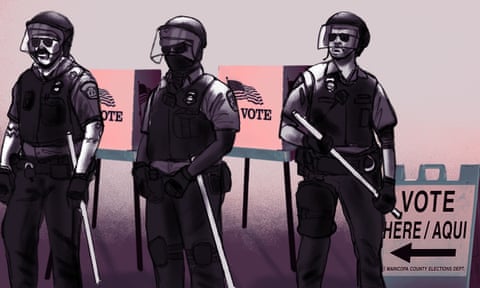
"Since the 2020 election, lawmakers in all but eight states have attempted to pass laws that would create new election investigation agencies, establish criminal penalties for election offenses or further empower law enforcement officials to investigate such crimes, according to an analysis by Reveal from the Center for Investigative Reporting.
The proliferation of election crime legislation represents the most intense voter suppression threat in decades and comes in direct response to former president Donald Trump’s lie that the 2020 election was fraudulent.
In the last two years, at least 130 bills have been introduced across 42 states that would increase the involvement of law enforcement in the voting process, the analysis shows. Of those bills, 28 have passed in 20 states.
Some of these efforts have grabbed attention individually, like Georgia’s law making it a crime to hand out food or drinks – even water – to voters waiting in line or Florida’s creation of an entirely new law enforcement agency to police elections, the office of election crimes and security, which has already been criticized for bringing flimsy prosecutions.
Reveal’s first-of-its-kind analysis shows those bills are part of a larger movement, mostly led by Republican state lawmakers and fueled by conspiracy theories. While some of those efforts have so far failed, they show no sign of relenting, as the myth of voter fraud has become a central GOP platform.
Three trends from the analysis stand out:
In 14 states, lawmakers have tried to empower law enforcement officials, such as prosecutors and police officers, to investigate suspected election crimes, arming them with new powers and requiring them to more aggressively pursue alleged offenses. In Tennessee, for example, Republican lawmakers in both legislative chambers filed bills that would have required at least 20% of investigators in the state bureau of investigation’s criminal investigation division to be designated as election crime specialists, along with the same share of prosecutors in every district attorney’s office. While that effort didn’t succeed, others did. Those include Georgia laws giving a statewide investigative agency new subpoena powersand creating a new hotline for the attorney general to receive voter fraud complaints; a New Hampshire law requiring the state attorney general to investigate alleged misconduct by election officials, with power to revoke those officials’ voting rights; and a Utah law requiring election officials to look for possible cases of a person voting more than once, and to report any suspected fraud to police or prosecutors.
Republican lawmakers have focused in particular on ballot collecting, a practice at the heart of false claims of fraud in the 2020 election. They’ve been inspired by Trump and the conspiracy theory film 2000 Mules, with both falsely claiming that leftist groups rigged the 2020 election by exploiting what they call “ballot harvesting”. Ballot collecting, long legal in many states, allows a person or group to return other voters’ absentee ballots. Nineteen states introduced bills to criminalize it after the 2020 election, and six passed them. Iowa, for example, has made it a crimepunishable by up to one year of imprisonment to turn in an absentee ballot for someone else, with a few exceptions.
In 12 states, lawmakers sought to increase the penalties for existing election crimes, changing the classification of some to felonies from misdemeanors. This could mean the difference, in some cases, between charges punishable by fines and probation versus prison time or loss of voting rights. In April 2021, South Carolina lawmakers introduced a bill that would sharply increase penalties for existing election crimes, including fraudulently voting or registering to vote. “Upon conviction”, the bill read, violators “must be imprisoned not less than thirty years without the possibility of parole”. The bill never gained traction, but in May, lawmakers succeeded in changing those and other voting offenses from misdemeanors to felonies, punishable by up to five years of imprisonment. South Carolina is one of five states that passed such laws.
The bills represent the latest chapter in the long history of US voter suppression. Throughout the Jim Crow era, Black Americans encountered poll taxes, literacy tests, state violence and intimidation if they wanted to vote. In the last decade, as the Voting Rights Act has been weakened, the suppression has appeared in more subtle ways as lawmakers have instituted voter ID requirements and closed polling places. Research shows these things make it more difficult for voters of color – particularly Black, Latino and Indigenous Americans – to cast a ballot.
Leslie Proll, senior director of voting rights at the Leadership Conference on Civil and Human Rights, said the nascent criminalization push is more intense than even during the Jim Crow era.
“This criminalization of the vote is a very concerning new form of suppression that certainly has roots in history,” Proll said. “But we’ve not seen it in the way that we’re seeing it now.”
The wave of legislation is being propelled by a phantom problem: study after study has shown that there is no widespread voter fraud, and Republican-led lawsuits and audits have failed to prove the claim that the 2020 election was stolen.
However, with the midterms approaching, conservative groups, militias and sympathetic law enforcement officials are ramping up plans to surveil voters. Those plans, combined with the new laws and enforcement powers, are setting the stage for a prosecutorial campaign this election day and beyond, one that doesn’t root out widespread fraud but instead punishes individuals for mistakes or small infractions.
The criminalization push could also deter people from voting at all.
“They’re tapping into an ancestral fear of the whole process,” said Allegra Lawrence-Hardy, a Georgia-based election law attorney at Lawrence & Bundy.
Reveal used records from LegiScan, which catalogues virtually every bill introduced by state-level lawmakers in all 50 states, to identify and classify every proposal related to election crimes following the 2020 election.
At least 65% of the proposed bills were introduced by Republicans or Republican-majority committees. When Democrats have advanced legislation, it has often criminalized election interference, in response to reports of harassment and threats against voters and poll workers.
In many cases, the proponents of the harshest laws are also purveyors of the lie that the 2020 election was stolen.

In Arizona, state senator Wendy Rogers introduced a bill this year to create a multimillion-dollar agency devoted to investigating election fraud. The Arizona attorney general’s office already has an election integrity unit that does just that.
Speaking to a crowd last year about the 2020 election, Rogers was clear about her goal.
“I want to see arrests,” she told a cheering audience. “I want to see perp walks.”
Rogers, who has praised white nationalists and said she wants to see her political opponents hanged, is closely allied with the GOP candidates for governor, attorney general and US Senate in her state, all of whom have been endorsed by Trump, are proponents of the big lie and have promised to crack down on alleged voter fraud if elected.
Attorney general candidate Abe Hamadeh has said he will “prosecute the crimes of the rigged 2020 election”. That’s despite a GOP-led audit of the 2020 results in Arizona’s largest county that found no evidence of fraud. Mark Finchem, the Republican candidate for secretary of state, has encouraged surveillance of ballot drop boxes – and armed men have already been spotted monitoring the boxes at night.
In their zeal to pursue election crimes, Arizona officials have often been ahead of the curve.
The state outlawed ballot collection back in 2016. Earlier this year, lawmakers there considered a bill targeting election workers. It would increase penalties for election officials who send an unsolicited absentee ballot – boosting the potential prison time from two years to 10.
The post-2020 push to crack down on voting
In Wisconsin, the Republican-led legislature got to work almost immediately after the 2020 election, as Trump and his surrogates obsessed over absentee ballots being a vector for voter fraud.
In March 2021, a group of state senators introduced a bill that would have made it a felony to return another voter’s absentee ballot, with limited exceptions for relatives and guardians. State senator Duey Stroebel, the author of the bill, described it as an effort to “safeguard the return of another person’s absentee ballot”.
That summer, legislators sent that and other election-related bills to Governor Tony Evers, a Democrat, who vetoed it. “This bill adds no additional security or fraud prevention beyond what our state laws already provide,” he said. “One can easily imagine the ways that the measures proposed in this bill would result in voters being deprived of their fundamental right to vote.”
But the state’s Republicans didn’t relent. Early this year, they introduced another wave of bills that would make it harder to vote.
Among them was legislation that would make it a felony for nursing home employees to force residents to vote or prevent them from voting. The bill was a response to a conspiracy theory about Trump’s 2020 loss in the Badger State: that pandemic-era changes to the administration of absentee voting at nursing homes had led to widespread fraud.
The bill passed within a couple of weeks of introduction. The theory, first propagated by a local sheriff’s office, was then debunked. And again, Evers exercised his veto power.
Evers is now locked in a tight re-election race against Tim Michels, who is endorsed by Trump and as governor would be in a position to enact the GOP’s legislative priorities ahead of the 2024 election. Meanwhile, because of redistricting in Wisconsin, Republicans could gain a supermajority in the state on 8 November. That would give them the ability to override Evers’ veto even if he wins re-election.
While Wisconsin presents a heightened example of the emerging threats to democracy, Reveal’s analysis shows attempts to criminalize voting have been wide reaching across the country.
For example:
Lawmakers in Minnesota’s divided legislature have considered a half-dozen election crimes proposals over the last two years, many of them introduced more than once. A Republican-sponsored proposal would have given county attorneys the power to investigate alleged “suspicious activity in a voter registration application”. The legislation did not define suspicious activity, but it would have required a county attorney to present charges to a grand jury – or risk losing their office. The state’s Republicans have also tried to criminalize ballot collection by making it a felony to fail to “immediately” return another person’s ballot. Those bills, introduced in 2021, didn’t make it very far, but lawmakers this year made efforts to create different felonies, such as pressuring someone to vote a certain way, which was previously a misdemeanor. Democrat-led bills included efforts to make it a felony to spread lies that would deter another person from voting or to intimidate an election worker.
In April, Georgia’s Republican lawmakers passed a bill that gives the state’s bureau of investigation subpoena powers over select election crimes. Civil rights groups such as the NAACP Legal Defense and Educational Fund criticized the law, saying: “We know that excessive law enforcement presence at the polls or involvement in elections generally can be intimidating to voters, and this is especially true in Black communities that have felt the brunt of well-documented abuse.” That came about a year after lawmakers there made it a crime to offer food or drinks to someone standing in line to vote. The Georgia house of representatives also passed a bill that would have made it a felony to watch someone vote, but it did not make it through the senate.
In January, Alaska legislators filed a bill that would have required police officers to be trained on election crimes. It would also have established a hotline to report election fraud and official misconduct. This was lawmakers’ fourth attempt over the course of one year to create such a hotline. The state legislature has also considered four proposals to criminalize ballot collecting.
In Maine, Democrats passed a law this year that increases the punishment for violently threatening or intimidating election officials. The local chapter of the ACLU opposed the measure, saying it would increase penalties for something that was already a crime without evidence that doing so would make workers safer.
In late August, the Florida governor, Ron DeSantis, called a press conference to celebrate the first prosecutions of his new elections investigation team. A presumed 2024 Republican presidential candidate, the governor said officials arrested 20 Florida residents who voted in the 2020 election despite having felony convictions that made them ineligible to vote.
Surrounded by uniformed officers, DeSantis issued a warning: “Today’s actions send a clear signal to those who are thinking about ballot harvesting or fraudulently voting. If you commit an elections crime, you will be prosecuted to the fullest extent of the law.”

He revealed scant details about the arrests. But it soon became clear that the prosecutions had problems. It turned out that in some cases, election officials – who were responsible for checking voter eligibility – had sent the voter in question a registration card. (A Miami judge has already thrown out one of the cases.)
DeSantis also touted a different part of the law that created the elections police unit: a provision on ballot collection. State lawmakers had first criminalized the practice in 2021, making it a misdemeanor to deliver more than two ballots on behalf of anyone other than a family member.
In less than a year, it had become a felony, punishable by up to five years in prison.
How Arizona’s ballot collection law played out in 2020
For years, election day in San Luis, Arizona, was a festive event. Whenever an election rolled around, parties – with music and carne asada – would pop up outside polling places in the small city tucked into the south-west corner of the state.
Guillermina Fuentes, the one-time mayor of San Luis and a fixture in the community, was always close to the center of the celebration. “In San Luis, people know two things: beans and Guillermina,” said Pastor Manuel Castro, who runs the local Gethsemani Baptist church and has known her for more than three decades.
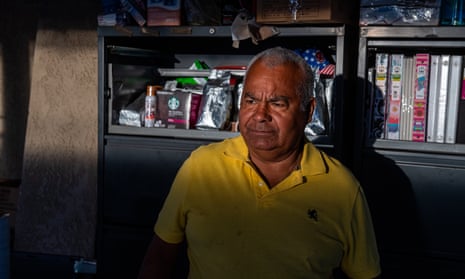
If the 66-year-old Fuentes was not running for office – she’d been a local city council and school board member, too – then she was out helping others vote, friends and family members said. In San Luis, which is 95% Latino, absentee voting can be particularly difficult. There is no home delivery mail service, and residents have a long tradition of assisting friends and neighbors with voting.
That’s how Fuentes spent primary election day in 2020.
It was Tuesday, 4 August, and Fuentes was stationed just outside the polling place at the Cesar Chavez cultural center, supporting a slate of city council candidates, answering voter questions and handing out campaign literature.
“Juntos saldremos,” read the blue shirts of the other volunteers: we’ll get out of this together.
Unbeknown to Fuentes and others, they were being surreptitiously recorded by a man in his car, Gary Snyder, a Republican write-in candidate for the San Luis city council.
He had been dispatched by fellow Republican David Lara, a perennial candidate for local office who knew Fuentes through his involvement in the local political scene. Lara, who owns a water and ice supply company, had run for city council, mayor and county supervisor numerous times. He ran for constable once. “Every two years, I was losing elections,” he said.
The reason, he said: voter fraud, specifically vote buying and absentee ballot fraud. Lara often complained about this, filing multiple reports with local and state officials, he said.
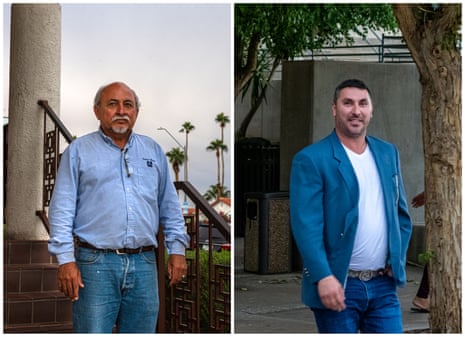
Nothing ever came of these grievances. But on the day of the 2020 primary, he decided to try something different. He asked Snyder to secretly record Fuentes and the others to collect evidence of a conspiracy.
“You are going to witness fraud like you’ve never believed before,” Lara said he told Snyder, who declined to be interviewed. “You wouldn’t believe it. But I’m going to disappear. I’m gonna pull away, because these people know me well. And if I’m around, they’re careful. You’re the newbie, so they’re gonna drop their guard. And just take as many pictures and videos as you can.”
As the day progressed, Snyder shared pictures and video with Lara.
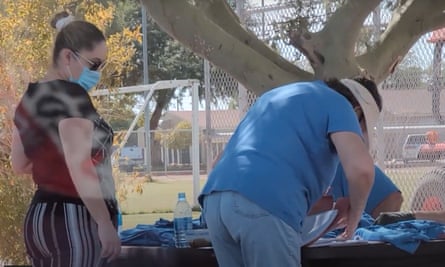
Then, a potential hit: at one point, Fuentes’ neighbor Alma Juarez approached the table of volunteers. Dark sunglasses shielded her eyes from the bright August sun. She was there briefly, just long enough to hand a ballot to Fuentes. Fuentes looked at it closely, appeared to write something on it, then handed it back to Juarez, along with a few other ballots that were sitting on the table.
Almost as quickly as she arrived, Juarez walked into the polling place with the ballots.
The interaction appeared unremarkable. It took less than 20 seconds. But to Lara and Snyder, it was evidence that Fuentes was part of the wide conspiracy they’d been trumpeting.
And now there was a law in Arizona to do something about it. Four years earlier, before Trump popularized “ballot harvesting” as a conservative talking point, Arizona lawmakers had passed a bill that prohibits anyone from collecting and returning someone else’s ballot, with limited exceptions. People who violate the “ballot abuse” law, as it became known, could face felony charges, punishable by up to two years in prison and a $150,000 fine.
The law was “designed to go after large-scale, knowing, massive collection of ballots that threatens the integrity of the system”, said Eric Spencer, then the election director at the secretary of state’s office. It was engineered to target criminal syndicates attempting to cheat the vote, not individual voters, he added.
The Democratic National Committee immediately challenged it in court, arguing that the law was meant to suppress the vote in Native American, Latino and Black communities. A federal appellate court agreed and struck down the law.
However, the supreme court’s conservative majority decided to uphold the law in 2021, further weakening the protections of the Voting Rights Act.
The first person to be targeted under the new law: Guillermina Fuentes.
The sheriff gets the video
The “Snyder video”, as it became known, quickly made it to the office of the Yuma county sheriff, Leon Wilmot.
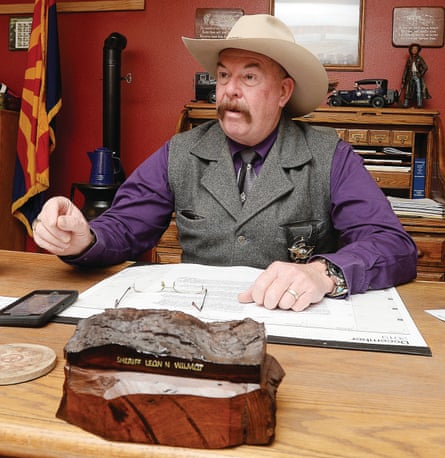
Two days after the 2020 primary election, his armed officers launched a door-to-door investigation into alleged vote tampering.
In body-worn camera videos from the investigation, obtained by Reveal through public records requests, officers peppered residents with questions about how they voted and whether anyone came to collect ballots from them.
At one woman’s home, officers asked how she had returned her early voting ballot.
“Are we in trouble for something?” she nervously asked. No, the officers said; they were “just making sure everybody’s vote actually gets counted”.
In a separate interaction, officers asked a man if he knew what was happening in San Luis with regard to voter fraud or ballot harvesting. “Do you have any knowledge of Guillermina Fuentes?” one of the officers asked.
The man, who did know Fuentes, said he believed that the people filing complaints were “targeting” San Luis voters and that police visiting residents at home would be “making those people fear for even voting”.
“I am shocked,” he told the officers. “There’s so much more that you guys should be doing.”
All told, police knocked on 40 doors, Fuentes’ defense lawyer Anne Chapman later said during a court hearing. Wilmot declined to be interviewed for this story.
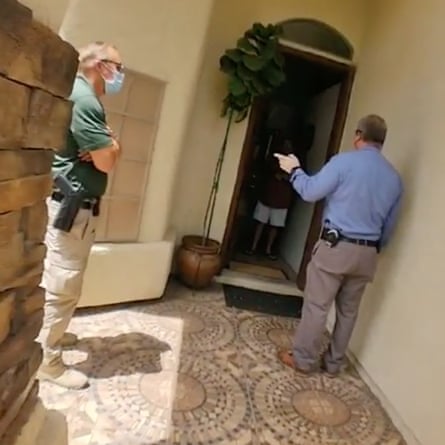
Eventually, the office of the Arizona attorney general, Mark Brnovich, took over the case. Investigators tried to figure out whose ballots Fuentes had been handling, even sending her fingerprints to the FBI for analysis at its Quantico, Virginia, headquarters. But they couldn’t find evidence that she had handled any ballots in a box from the polling location. One of the ballots belonged to Hilda Juarez, Alma Juarez’s sister, court records show.
In the end, investigators didn’t appear to find any evidence of a wider conspiracy and built their case around the Snyder video. In early December, the state charged Fuentes and Juarez with ballot abuse for handling four ballots.
Neither woman was accused of voting illegally or of buying or selling ballots, according to court records.
Officials had scrutinized the ballots, comparing the signatures to the ones in the voters’ registration files. The votes were ultimately counted.
Earlier this year, both women pleaded guilty, admitting to having touched and later deposited the ballots. Juarez pleaded guilty to a misdemeanor offense of ballot abuse.
Fuentes’ plea, meanwhile, was for a felony. Both Fuentes and Juarez declined to comment.
But in court records, Fuentes told state investigators that she had not completed a ballot for any of the voters and said she never forced community members to give her their ballots. She dismissed claims that she was a “ballot harvester” as politically motivated.
“I’m not a criminal,” she said. “For so long, I would help people with their right to vote.”
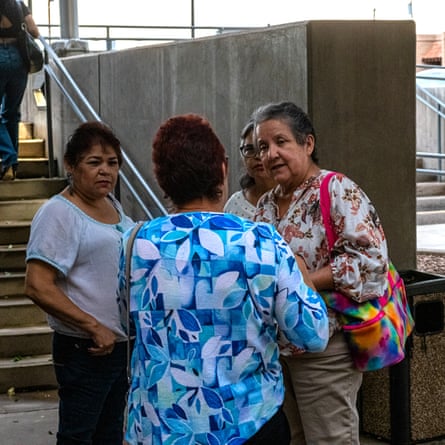
Lead prosecutor Todd Lawson said Fuentes abused her prominent position in the community to illegally collect the four ballots.
Fuentes “appears to have been caught on video running a modern-day political machine seeking to influence the outcome of the municipal election in San Luis, collecting votes through illegal methods, and then using another person to bring the ballots the last few yards into the ballot box”, Lawson wrote in a sentencing memo. He sought a one-year prison sentence for Fuentes.
Her lawyers have pointed out that the one-year sentence was harsher than penalties Lawson sought for some others in the state charged with illegal voting.
In 2020, Tracy Kay McKee voted on behalf of her dead mother. Lawson’s recommendation: 30 days in jail. That’s a fraction of what he recommended in Fuentes’ case.
McKee is a white Republican. Fuentes is a Latina Democrat.
Chapman, Fuentes’ attorney, raised the disparity in an October hearing ahead of her client’s sentencing.
“The attorney general asked for 30 days of jail time in a case involving a white woman who voted an actual fraudulent ballot for a Republican candidate,” Chapman said.
“In this case, all of the ballots were signature verified and voted. There was no fraudulent ballot voted,” she added. “What are the differences in these cases that would call for a sentence requested by the attorney general’s office that is 12 times harsher than that requested for a white woman who voted a false ballot of a dead person?” (The court ultimately sentenced McKee to two years’ probation.)
Lawson did not respond to Reveal’s request for comment. In court, he said it was “patently untrue” that the state was seeking steeper penalties for Fuentes for “racist purposes”.
“This is a case about integrity of campaigns, integrity of the ballot and the handling of ballots,” Lawson said.
For his part, David Lara said in an interview with Reveal that the state should use capital punishment to deal with people who violate election laws.
“If it was up to me, voter fraud should be death penalty, because people should not mess with a vote,” Lara said. “That is sacred to me.”
When pressed on whether Fuentes deserved a penalty that strict, he walked it back. A year’s incarceration would be an appropriate sentence in her case, he said.
A chilling effect in the Arizona desert

As part of her plea agreement, Fuentes lost her voting rights and is barred from holding public office. She had to give up her school board seat earlier this year.
At her sentencing hearing on 13 October, Judge Roger Nelson called Fuentes a criminal. “You committed a criminal offense,” he said. “I don’t think you recognize that.”
He sentenced Fuentes to 30 days in jail. Some people in the courtroom started to cry.
Lizette Esparza, Fuentes’ daughter, said in an interview that the last two years had been especially taxing for her family. “It’s very heartbreaking to see what my mom has to go through for something that has been a common practice,” said Esparza, a local elementary school superintendent.
“To me, it’s not only unfair, but I really think that this is political – I even wanna say it’s a persecution,” she said. “It’s gonna trickle down to the community.”
Luis Marquez met Fuentes when they both worked the fields as teenagers. A retired San Luis police officer, he testified in support of Fuentes. He said the case has seeded fears about voting in San Luis.
“Every time you talk about a ballot, people are like – they get nervous about it,” he said.
“It deterred a lot of people from helping anybody else,” he added.
The surge in new election crimes bills is troubling for communities like San Luis, said Andy Gaona, an elections attorney at Coppersmith Brockelman, a Phoenix law firm. He handled an appeal in Fuentes’ case and is a member of the Arizona Voter Empowerment Task Force.
“As someone who operates in this space, it’s very concerning and it sets a dangerous precedent going forward,” Gaona said. “What it demonstrates is that the big lie has intensified the efforts in certain states to criminalize voters and to discourage them from voting.”
Meanwhile, the local sheriff and state attorney general are continuing to investigate election cases in San Luis. This past spring, the sheriff announced that his office was investigating 16 cases of alleged voting fraud involving ballots cast in 2020 and voter registrations ahead of this year’s August primary election.
Wilmot’s office has provided limited information about the investigations, but public records obtained by Reveal show that none of the cases point to widespread fraud.
In one case, a sergeant visited an elderly woman. He told the woman that the signature on her ballot did not match her voter registration and that officials suspected the signature was forged. Her response: “I’m an old lady and I’m shaky.”
The sheriff’s office has not yet filed any criminal charges in relation to the open investigations.
But Wilmot’s been recognized by the Constitutional Sheriffs and Peace Officers Association – a nationwide movement of sheriffs who assert that they are the ultimate authorities on US law – for his investigations in Yuma county. The association has teamed up with the non-profit True the Vote, which has a history of making baseless voter fraud claims and questionable financial transactions, to draw up plans to police the upcoming election.
“We’re gonna make sure that we have election integrity this year,” Mark Lamb, an Arizona sheriff, said at a July Trump rally in the state. “Sheriffs are going to enforce the law. This is about the rule of law. It is against the law to violate elections laws – and that’s a novel idea, we’re going to hold you accountable for that. We will not let happen what happened in 2020.”
A week after Fuentes’ sentencing, Brnovich announced new indictments in San Luis, charging two more women with illegally handling ballots during the 2020 primary. Lara and Snyder celebrated the indictments on social media.
The cases have energized Lara in his decades-long crusade against voter fraud. He told Reveal that he collaborated with True the Vote early this year, providing the non-profit with information on the San Luis prosecutions. Fuentes’ case ended up in the film 2000 Mules.
Kari Lake, the Republican candidate for governor, has amplified the Snyder video and his claims about Fuentes’ case on social media, giving his political profile a boost. Snyder is now running for state senate.
As for Lara, he intends to be back out there on election day. “Same gameplan,” he said.
This article was produced by Reveal from the Center for Investigative Reporting. Reporters Melissa Lewis, Cassandra Jaramillo and Jessica Pishko contributed to this story."
No comments:
Post a Comment